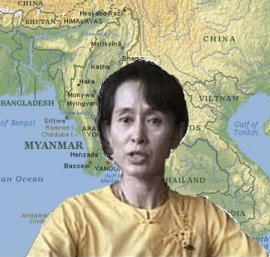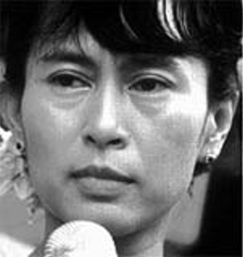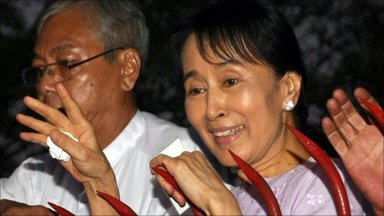Home Interesting Women - More
AUNG SAN SUU KYI (b.1945)
Aung San Suu Kyi is the woman who should be the elected president of Burma (now called Myanmar). The Burmese military government wouldn't honour the 1990 election result when her party against tremendous odds won 82% of the vote. She is also probably the world's most famous political prisoner.
Aung San Suu Kyi is truly a woman of the world. Reading about her life makes you realize the amazing number of countries she's lived in and the breadth of her acquaintance with people from many lands. It also makes you catch your breath at the huge sacrifices she's made for her country.
She was born in 1945 in Rangoon. In 1947 her father, a revered military hero was assassinated in the struggle for Burmese independence . Her mother, Daw Khin Kyi became a prominent public figure and in 1960 was appointed as Burma's ambassador to India. Suu Kyi accompanied her mother to New Delhi.
From 1964-67 she went to St. Hugh's College, Oxford University in England and got a B.A. in philosophy, politics and economics. From 1969-71 she went to live in New York to do graduate studies. Her friend Ma Than E introduced her to the United Nations and Suu Kyi joined the U.N. Secretariat as Assistant Secretary, Advisory Committee on Administrative and Budgetary Questions. In the evenings and at weekends she volunteered at a hospital, helping patients to read.
In January 1972 she married Michael Aris, joining him in the Himalayan kingdom of Bhutan, where he tutored the royal family and headed their Translation Department. She became Research Officer in the Royal Ministry of Foreign Affairs. In 1973 they returned to England and she had her 2 children whilst living there.
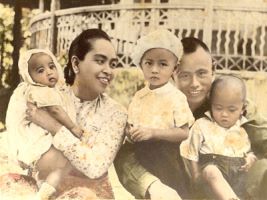
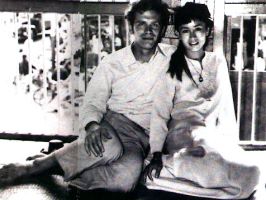
In 1985-6 she was the visiting Scholar, Center of Southeast Asian Studies, Kyoto University, researching her father's time in Japan. She wrote several books during the preceding years.
Her life so far would have been remarkable enough but in 1988 her mother was taken ill and Suu Kyi returned to Burma.
On August 8th there was a mass uprising throughout country. Followed by violent suppression by the Military Government which killed thousands.
On August 15th Suu Kyi, in her first political action, sent an open letter to the government asking it to prepare a plan for multi-party elections.
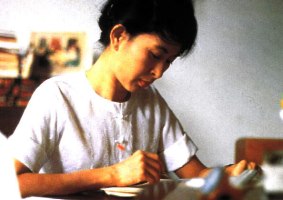
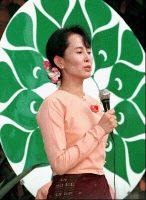
Nine days later she made her first public speech to several hundred thousand people outside Shwedagon Pagoda, calling for democratic government. Michael and her two sons were there.
Following this the government banned political gatherings of more than 4 persons. Suu Kyi on September 24th formed the National League for Democracy (NLD),with a policy of non-violence and civil disobedience. Defying the ban, Suu Kyi went on a tour throughout the country speaking to large audiences. On December 27th her mother Daw Khin Kyi, died aged seventy-six.
Six days later whilst attending the huge funeral procession for her mother Suu Kyi vowed that she would serve the people of Burma as her father and mother had, even unto death.
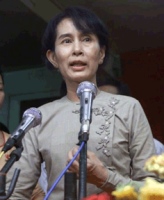
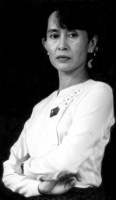
The military granted an election convinced that the huge number of parties would prevent a convincing result and also banning Aung San Suu Kyi from standing. Suu Kyi continued her campaign despite harassment, arrests and killings by soldiers.
In April at a demonstration she courageously walked toward rifles some soldiers were aiming at her.
On July 20th Suu Kyi was placed under house arrest without charge or trial. Her sons were already with her. On hearing of this Michael flew to Rangoon and found her on the third day of a hunger strike, asking to be sent to prison to join students arrested at her home. He negotiated the end of this when the good treatment of students was promised.
In 1990 the election finally took place and in spite of (or because of!) Suu Kyi's continuing detention her party, NLD won 82% of the parliamentary seats.
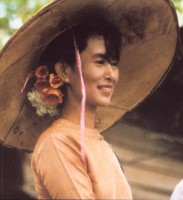
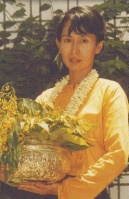
Of course the Burmese 'government' refused to recognise the result.
In October Suu Kyi was given the 1990 Rafto Human Rights Prize.
On July 10th 1991 the European Parliament awarded Suu Kyi the Sakharov human rights prize.
And on October 14th the Norwegian Nobel Committee announced that Suu Kyi was the winner of 1991 Peace Prize.
Her sons went to Oslo to accept the award on her behalf. At the presentation the Chairman of the Nobel Peace Prize Committee, Francis Sejested called her "an outstanding example of the power of the powerless".
Suu Kyi pledged to use the $1.3 million prize money to establish health and education trusts for the Burmese people.
In 1995 she was finally released from detention but her movements continued to be restricted. She has not left Burma but has smuggled out statements to the world on video. During this year she was finally allowed to see her husband.
In a tragic development to her story on March 27th 1999, her husband Michael Aris died of prostate cancer in London. He had petitioned the Burmese authorities to allow him to visit Suu Kyi one last time, but they had rejected his request. He had not seen her since a Christmas visit in 1995. The government always urged her to join her family abroad, but she knew that she would not be allowed to return. This separation she regarded as one of the sacrifices she has had to make in order to work for a free Burma.
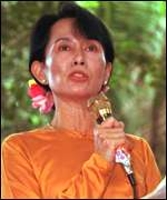
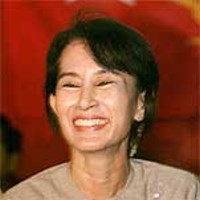
She was detained again from September 2000 until May 2002, during which time the NLD was having secret negotiations with the junta in an effort to break the political deadlock.
However in May 2003 she was yet again detained, taken into "protective custody" as confrontations between the NLD and government supporters increased. Following a major gynaecological operation in September she was allowed to return home, under effective house arrest again.
Suu Kyi looks to be a frail, slight figure but this obviously hides an iron determination and courage that is completely undaunted by tremendous suffering. Her Buddhist faith helps her survive.
She meditates daily, a discipline that provides insight into life beyond the external reality most of us perceive, and she keeps strictly to Buddhist proscriptions against harming, hate, fear and ego.
The UN envoy Razali Ismail has said privately that the opposition leader is undoubtedly one of the most impressive people he has ever met, and the Burmese junta owe it to the rest of the world to allow her to realise her potential - for he is certain that not only Burma but Asia will benefit from her political leadership.
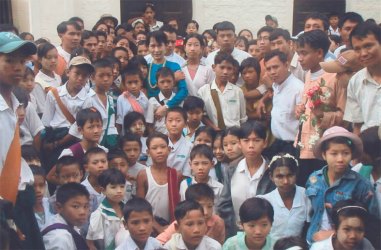
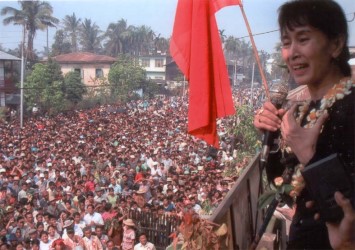
After years of trying to ignore and belittle Aung San Suu Kyi, Burma's generals were rumoured to have been in secret talks with her on Burma's political future. It raised hopes inside and outside the country that this could eventually lead to some form of democracy.
This rumour spread around the world a few years ago, but no positive steps have taken place. The brutal oppression of the people in Burma continues to this day. In fact it just seems to get worse.
An uprising led by Buddhist monks and supported by the people was brutally suppressed in October 2007.
In November 2010 the Burmese regime held a fake election which was condemned throughout the world and boycotted by Suu Kyi's party.
Of course the regime 'won'.
13th November 2010 Today Suu Kyi was released from the house arrest which has consumed 15 years of the last 20 of her life.
She was allowed to address her supporters and looked delighted and happy.
But whether this will turn into real freedom we will have wait and see. Perhaps it's the early days of a change or perhaps the regime will find some new way to penalise and persecute her.
One day the tyrants will have to fall as they always do.
I sincerely hope that one day the world will see Burma have a truly democratic government, hopefully led by its most able and true leader Aung San Suu Kyi.
